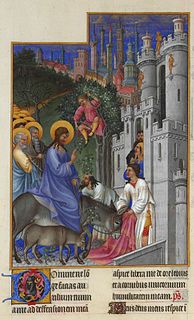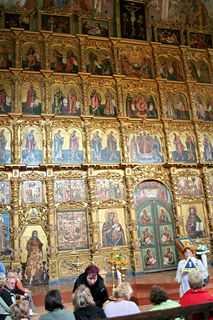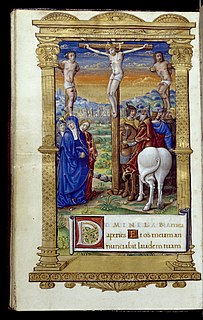| Look up matins in Wiktionary, the free dictionary. |
Matins is the canonical hour ending at dawn in the Roman Catholic monastic Liturgy of the Hours.
Contents
Matins may also refer to:
| Look up matins in Wiktionary, the free dictionary. |
Matins is the canonical hour ending at dawn in the Roman Catholic monastic Liturgy of the Hours.
Matins may also refer to:
| Search for "matins" on Wikipedia. |

Great Lent, or the Great Fast, is the most important fasting season in the church year in the Eastern Orthodox Church, Byzantine Rite Lutheran Churches and the Eastern Catholic Churches, which prepares Christians for the greatest feast of the church year, Pascha (Easter).

Song of Ascents is a title given to fifteen of the Psalms, 120–134, each starting with the superscription Shir Hama'aloth, or, in the case of Psalm 121, Shir Lama'aloth. They are also variously called Gradual Psalms, Songs of Degrees, Songs of Steps, songs for going up to worship or Pilgrim Songs.

In some traditions of Christianity, Holy Week is the most sacred week in the Church year. In Eastern Rite Churches, also known as Eastern Orthodox, Holy Week occurs the week after Lazarus Saturday and starts on the evening of Palm Sunday. In the rites of the Western/Latin/Roman Church it begins with Palm Sunday and concludes on Easter Sunday. For all Christian traditions it is a moveable observance. In Eastern Rite Churches, Holy Week starts after 40 days of Lent and two transitional days, namely Saturday of Lazarus and Palm Sunday. In Western Rite Churches, Holy Week falls on the last week of Lent or Sixth Lent Week.

In the practice of Christianity, canonical hours mark the divisions of the day in terms of fixed times of prayer at regular intervals. A book of hours, chiefly a breviary, normally contains a version of, or selection from, such prayers.

Holy Saturday, also known as Great and Holy Saturday, the Great Sabbath, Hallelujah Saturday, Saturday of the Gloria and Black Saturday or Easter Eve, and called "Joyous Saturday", "the Saturday of Light", and "Mega Sabbatun" among Coptic Christians, is the final day of Holy Week, between Good Friday and Easter Sunday, when Christians prepare for the latter. The day commemorates the Harrowing of Hell while Jesus Christ's body lay in the tomb. Christians of the Catholic, Lutheran, Methodist, Anglican and Reformed denominations begin the celebration of the Easter Vigil service on Holy Saturday, which provides a transition to the season of Eastertide; in the Moravian Christian tradition, graves are decorated with flowers during the day of Holy Saturday and the celebration of the sunrise service starts before dawn on Easter Sunday.

The Byzantine Rite, also known as the Greek Rite or the Rite of Constantinople, identifies the wide range of cultural, liturgical, and canonical practices that developed in the Eastern Orthodox Church of Constantinople.
Matins, or Mattins, is a canonical hour of Christian liturgy.

Lauds is a canonical hour of the Divine office. In the Roman Rite Liturgy of the Hours it is one of the major hours, usually held after Matins, in the early morning hours.

Tenebrae is a religious service of Western Christianity held during the three days preceding Easter Day, and characterized by gradual extinguishing of candles, and by a "strepitus" or "loud noise" taking place in total darkness near the end of the service.

Holy Monday or Great and Holy Monday is a day of the Holy Week, which is the week before Easter. According to the gospels, on this day Jesus Christ cursed the fig tree, cleansed the temple, and responded to the questioning of his authority.

Holy Tuesday, Fig Tuesday, or Great and Holy Tuesday, is a day of Holy Week, which precedes Easter.

The Liturgy of the Hours or Divine Office or Work of God or canonical hours, often referred to as the Breviary, is the official set of prayers "marking the hours of each day and sanctifying the day with prayer". It consists primarily of psalms supplemented by hymns, readings and other prayers and antiphons prayed at fixed prayer times. Together with the Mass, it constitutes the official public prayer life of the Church. The Liturgy of the Hours also forms the basis of prayer within Christian monasticism.
Orthros or Oútrenya, in the Byzantine Rite of the Eastern Orthodox Church and the Eastern Catholic Churches, is the last of the four night offices, the other three being vespers, compline, and midnight office. Traditionally, in monasteries it is held daily so as to end immediately following sunrise, in contrast to parishes where it is held only on Sundays and feast days. It is often called matins after the office it most nearly corresponds to in Western Christian churches.
Divine Office may refer to:
Prime, or the First Hour, is one of the canonical hours of the Divine Office, said at the first hour of daylight, between the dawn hour of Lauds and the 9 a.m. hour of Terce. It remains part of the Christian liturgies of Eastern Christianity, but in the Latin Rite it was suppressed by the Second Vatican Council. In the Coptic Church, a denomination of Oriental Orthodox Christianity, the office of Prime is prayed at 6 am in eastward direction of prayer by all members in this denomination, both clergy and laity, being one of the seven fixed prayer times. Roman Catholic clergy under obligation to celebrate the Liturgy of the Hours may still fulfil their obligation by using the edition of the Roman Breviary promulgated by Pope John XXIII in 1962, which contains Prime. Like all the liturgical hours, except the Office of Readings, it consists mainly of Psalms. It is one of the Little Hours.
In Christianity, the Little Hours or minor hours are the canonical hours other than the three major hours.
A gospel originally meant the Christian message, but in the 2nd century it came to be used also for the books in which the message was set out.
Eastern Orthodox worship in this article is distinguished from Eastern Orthodox prayer in that 'worship' refers to the activity of the Christian Church as a body offering up prayers to God while 'prayer' refers to the individual devotional traditions of the Orthodox.

A liturgical book, or service book, is a book published by the authority of a church body that contains the text and directions for the liturgy of its official religious services.
Morning Prayer may refer to: